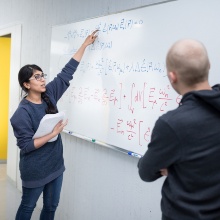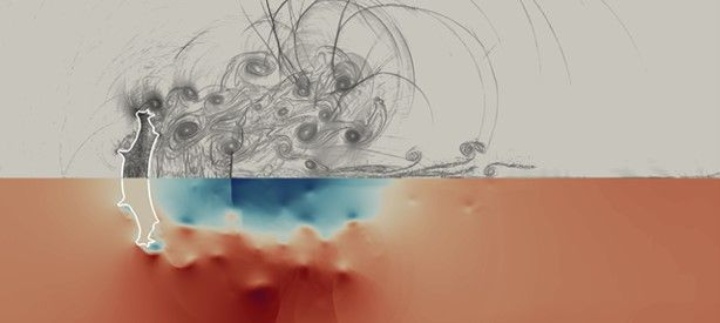The overarching goal of the new Research Training Group “Towards Graduate Experts in Photonic Quantum Technologies” at the University of Stuttgart, which the German Research Foundation (DFG) approved for funding at its meeting on 6 November 2020, is to utilize the great potential of quantum physics for marketable applications. Funding for the international Research Training Group “Droplet Interaction Technologies” (DROPIT), which was established in 2016, was extended by four and a half years.
Research training groups offer doctoral students the opportunity to complete their doctorate at a high professional standard and benefit from a structured research and program leading to a qualification. Currently the DFG is funding 222 research training groups, 34 of which are international.
Research Training Group “Towards Graduate Experts in Photonic Quantum Technologies”
Spokesperson: Prof. Jörg Schulze, University of Stuttgart, Institute for Semiconductor Engineering, phone: +49 711 685 68003, email:
Quantum physics has led to a variety of possible applications in the fields of quantum sensing, quantum computing, quantum cryptography, and quantum measurement technology – enabling highly efficient computers, tap-proof data transmission, and better diagnosis of diseases.
For all these applications, proof-of-principle implementations have been demonstrated. However, only a few of applications have been developed into commercially available products. The goal of the new research training group is exactly on fostering this transition.
The challenges of technology transfer in photonic quantum technologies are manifold: First, many concepts rely on exotic and costly materials or fabrication processes and are thus inappropriate for industrial applications. Second, proof-of-principle implementations have been demonstrated only in well-controlled laboratory environments. Third, the level of integration has to be improved, as typical demonstrations up to now require large setups with bulk components.
Tackling these challenges requires a new kind of professional: The Photonic Quantum Engineer, who is an expert in both quantum physics and engineering. Therefore, the Research Training Group will establish a new training program with a focus on interdisciplinary research and training. Each doctoral researcher will be supervised by one expert from physics and one from engineering.
The Research Training Group builds on activities of the Stuttgart Research Center of Photonic Engineering (SCoPE) and the Center for Integrated Quantum Science and Technology (IQST). SCoPE fosters interdisciplinary research between engineering and physics as well as academia-industry cooperations. It has established a Master’s program on Photonic Engineering. IQST stimulates synergies and high-risk projects in basic research in quantum science across fields such as physics, materials science, biology, engineering, chemistry, medicine, and information science.
International Research Training Group „Droplet Interaction Technologies“ (DROPIT)
The universities of Stuttgart, Bergamo (Italy), and Trento (Italy)
Spokesperson: Prof. Bernhard Weigand, University of Stuttgart, Institute of Aerospace Thermodynamics (ITLR), phone: +49 711 685-63590, email
Interaction between droplets as well as the interaction between individual droplets and their environment play a key role in many industrial applications: in evaporation processes, in spray cooling of food, in engine combustion processes, and in space travel. The droplet interactions taking place here are the focus of the DROPIT Research Training Group, which was established in 2016 and whose funding has now been extended by another four and a half years.
The latest technological advances and the need to develop suitable design tools requires taking into account interface kinetics and/or a detailed analysis of surface microstructures. Usually, however, the complex technical processes obscure the underlying individual processes. For this reason, extracting and modeling these individual processes is very difficult. The Research Training Group is investigating precisely these processes.
Different types of droplet interaction, such as the interaction between droplets and gas, droplets and walls, and droplets and liquids, are being examined - three areas that are strongly interconnected. In the now approved second funding period, the research program will be consistently expanded to include the interaction between several droplets as well as additional physical phenomena.
The German Research Foundation is funding the eleven German subprojects in the Research Training Group with a total of more than EUR 4 million. A number of researchers from the Italian universities of Bergamo and Trento are actively involved in the projects. The participating researchers from Stuttgart are: Andrea Beck, Carina Bringedal, Thomas Ertl, Stefanos Fasoulas, Rainer Helmig, Grazia Lamanna, Claus-Dieter Munz, Christian Rohde, Kathrin Schulte, Bernhard Weigand, and Daniel Weiskopf. The Bergamo researchers are Lorenzo Botti, Gianpietro, Elvio Cossali, Maurizio Santini, and Simona Tonini, and Michael Dumbser is the participating researcher from Trento. The training program of the Research Training Group comprises both specialist seminars and international workshops. There is also a summer school taking place every three years. The exchange and networking of the individual participants in the international Research Training Group is of particular importance.
The close cooperation of the researchers in Stuttgart, Bergamo, and Trento during the first funding period has led to a large number of outstanding scientific results, which the researchers also published in the form of a book at Springer Verlag.
These achievements were made possible thanks to the brilliant doctoral researchers and postdocs in Stuttgart, Bergamo, and Trento. This year, two female doctoral researchers from the Institute of Aerospace Thermodynamics at the University of Stuttgart, Martina Baggio and Karin Schlottke, received one of the Amelia Earhart Fellowships by Zonta International. Each fellowship is valued at USD 10,000.
Expert Contact:
Research Training Group “Towards Graduate Experts in Photonic Quantum Technologies”
Spokesperson: Prof. Jörg Schulze, University of Stuttgart, Institute for Semiconductor Engineering, phone +49 711 685-68003 E-Mail.
International Research Training Group „Droplet Interaction Technologies“ (DROPIT) https://www.project.uni-stuttgart.de/dropit/
The universities of Stuttgart, Bergamo (Italy), and Trento (Italy)
Spokesperson: Prof. Bernhard Weigand, University of Stuttgart, Institute of Aerospace Thermodynamics (ITLR), phone: +49 711 685-63590, E-Mail.



